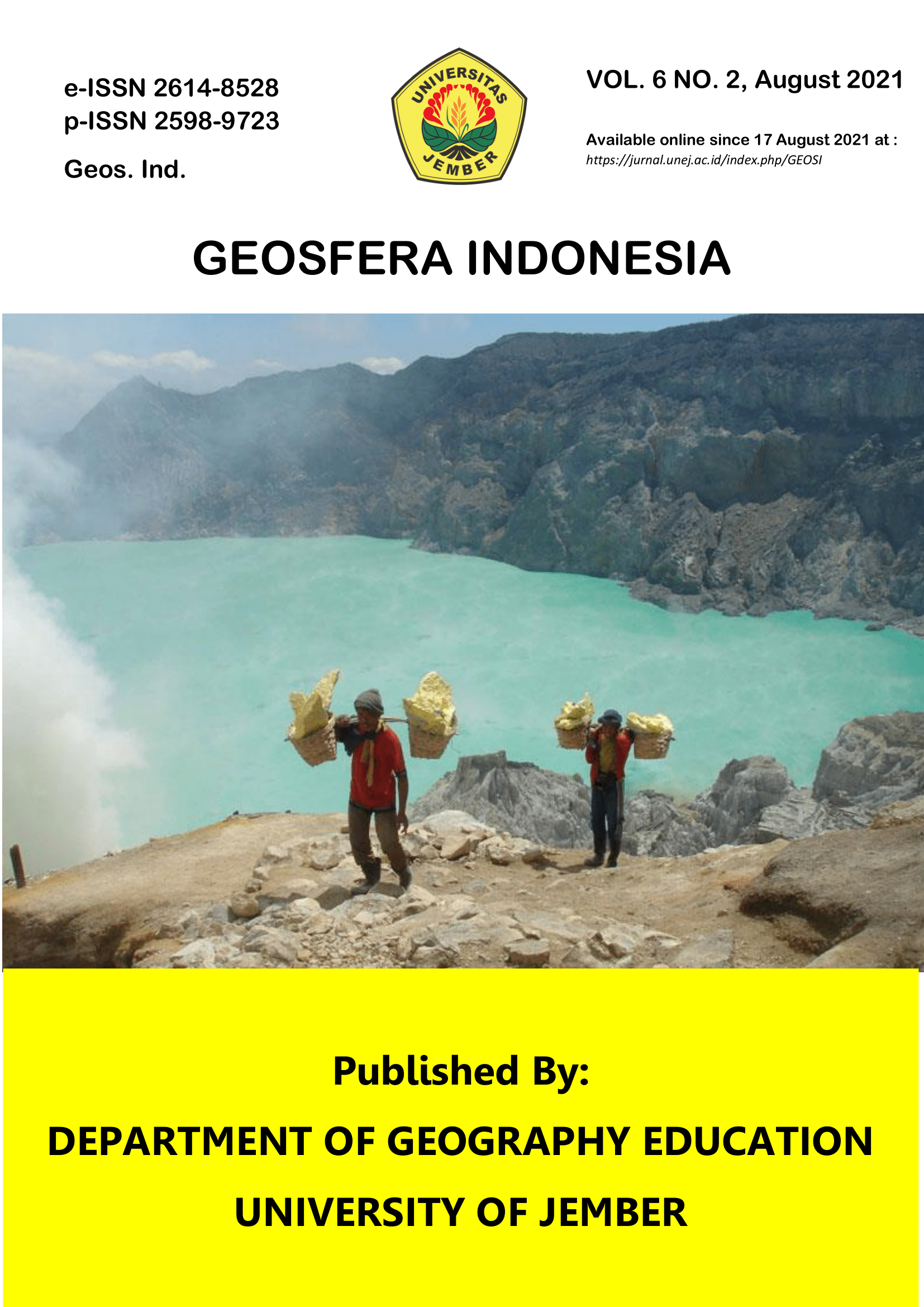Analysis on Factors Influencing Geography Teachers’ Ability in Constructing High-Order Thinking Skills (HOTS) Assessment Instrument
Abstract
The teacher's ability to construct assessment instruments is a focus that needs to be considered. Furthermore, the demand of the 21st century directs teachers to set questions that are oriented to train students' abilities in higher-order thinking. However, several factors affect the ability to construct HOTS-oriented assessment instruments. This study aims to investigate what factors influence geography teachers’ ability to develop higher-order thinking skills (HOTS) instruments to measure learning outcomes. This study used a survey method with a quantitative approach. The data collection technique was field observation, and multiple linear regression was used for analysis. The results showed the linearity of teacher education regarding the length of teaching geography was 0.904, the tertiary institution was 0.009, and the background of education was 0.019. Also, teachers' certification was 0.007, their training was 0.032, and their experience in making HOTS questions was 0.047. The coefficient value of determination R, namely 0.635 means the relationship between teaching length, the linearity of their education in tertiary institutions, background, certification, training, and experience regarding the ability to develop HOTS-oriented assessment instruments is 63.5%. This means the relationship is strong, and 36.5% is another factor. This study concludes that the factors that significantly affect the ability of geography teachers in developing HOTS-oriented assessment instruments are the linearity factor of teacher education in universities, education background, certification, teacher training and experience in making HOTS questions.
Keywords: Teacher ability factors; Assessment, Higher-order thinking skills
Copyright (c) 2021 Geosfera Indonesia and Department of Geography Education, University of Jember

This work is licensed under a Creative Commons Attribution-Share A like 4.0 International License
References
Ahmad, D. (2014). Understanding the 2013 Curriculum of English Teachers Through the Teachers’ and Policymakers’ Perspectives. International Journal of Enhanced Research in Educational Development, 2(4).
Anderson, L.W., & Krathwohl, D.R. (2010). Kerangka landasan untuk pembelajaran, pengajaran, dan asesmen (terjemahan Agung Prihantoro). New York: Addition Wesley Longman.
Anggela, R. (2015). Hubungan antara Kompetensi Profesional Guru dan Motivasi Kerja Guru Dengan Prestasi di Kota Yogyakarta Tahun Ajaran 2012/2013. EDUKASI: Jurnal Pendidikan, 13(1).
Artvinli, E. (2017). What is Innovative Geography Teaching? A Perspective from Geography Teachers. Journal of Education and Training Studies, 5(6). https://doi.org/10.11114/ jets.v5i6.2383.
Astuti, A. P., Aziz, A., Sumarti, S. S., & Bharati, D. A. L. (2019). Preparing 21st Century Teachers: Implementation of 4C Character’s Pre-Service Teacher through Teaching Practice. Journal of Physics: Conference Series, 1233(1). https://doi.org/10.1088/1742-6596/1233/1/012109.
Ati, A., Ruhimat, M., Yani, A. (2019). Pemahaman Guru Geografi Terhadap Konsep dan Pelaksanaan Penilaian Autentik di SMA Negeri Pulau Buton. Edusentris, 6(2), 59-68.
Avargil, S., Herscovitz, O., & Dori, Y. J. (2012). Teaching Thinking Skills in Context-Based Learning: Teachers’ Challenges and Assessment Knowledge. Journal of Science Education and Technology, 21(2), 207–225. https://doi.org/10.1007/s10956-011-9302-7.
Ayuni, F. N. (2016). Pemahaman Guru Terhadap Pendekatan Saintifik (Scientific Approach) Dalam Pembelajaran Geografi. Jurnal Geografi Gea, 15(2), 1–7. https://doi.org/10.17509/ gea.v15i2.3542.
Barak, M., & Dori, Y. J. (2009). Enhancing higher order thinking skills among inservice science teachers via embedded assessment. Journal of Science Teacher Education, 20(5), 459–474. https://doi.org/10.1007/s10972-009-9141-z.
Barathimalar, A. (2014). The acceptance and problems faced by teachers in conducting higher order thinking skills. Doctoral Dissertation. Universiti Teknologi Malaysia.
Brookhart, S. M. (2010). How to Assess Higher-Order Thinking Skills in Your Classroom. Alexandria: ASCD.
Budiastini, N. P. D., Astawa, I. B. M., & Sriartha, I. P. (2020). Kualitas Penerapan Asesmen Autentik Berbasis HOTS Guru Geografi SMA. Jurnal Pendidikan Geografi Undiksha, 8(2), 76. https://doi.org/10.23887/jjpg.v8i2.25352.
Chalkiadaki, A. (2018). A systematic literature review of 21st century skills and competencies in primary education. International Journal of Instruction, 11(3), 1–16. https://doi.org /10.12973/iji.2018.1131a.
Jannah R., & Ernawati, E. (2020). Analisis Level Kognitif Soal Ujian Akhir Semester (UAS) Geografi Kelas XI Semester Gasal SMA Negeri Se-Kota Pariaman Tahun Pelajaran 2019/2020 Berdasarkan Taksonomi Bloom Revisi Anderson. Jurnal Buana, 4(6).
Eyal, L. (2012). Digital assessment literacy-the core role of the teacher in a digital environment. Educational Technology and Society, 15(2), 37–49.
Fadiarman, F. (2018). Hubungan Latar Belakang Pendidikan dan Sikap Terhadap Profesi Guru dengan Kompetensi Pedagogik Pembelajaran IPS Guru SMP. Jurnal Geografi, Edukasi dan Lingkungan (JGEL), 2(1), 55–64.
Fanani, M. Z. (2018). Strategi Pengembangan Soal HOTS Pada Kurikulum 2013. Edudeena, 2(1), 57–76. https://doi.org/10.30762/ed.v2i1.582.
Gerber, R., & Chuan, G. K. (2000). Fieldwork in Geography: Reflections, Perspectives and Actions. Berlin : Springer Science and Business Media.
Helmi, D. (2018). Strategi Guru Geografi dalam Mengimplementasikan Standar Proses Permendikbud No 22 Tahun 2016 pada Pembelajaran Geografi di SMA Negeri Kabupaten Solok. Jurnal Kapita Selekta Geografi, 1(2), 141–148.
Heong, Y. M., Othman, W. B., Yunos, J. B. M., Kiong, T. T., Hassan, R. Bin, & Mohamad, M. M. B. (2011). The Level of Marzano Higher Order Thinking Skillsamong Technical Education Students. International Journal of Social Science and Humanity, 1(2), 121–125. https://doi.org/10.7763/ijssh.2011.v1.20.
Hong, C., & Salika, E. (2011). Action Research in Teacher Education: Classroom Inquiry, Reflection, and Data-Driven Decision Making. Journal of Inquiry and Action in Education, 4(2), 1–17.
Ikhsan, F. A., Kurnianto, F. A., Apriyanto, B., & Nurdin, E. A. (2017). Efforts to Improve the Competency of Professionalism Teacher in Jember Regency. Geosfera Indonesia, 1(1). https://doi.org/10.19184/geosi.v1i1.6191.
Iswandi, & Richardo. (2017). Pengaruh latar belakang bidang studi, tingkat pendidikan dan pengalaman mengajar terhadap kemampuan profesional guru pada SMA Kartika XIV 1 Banda Aceh. Genta Mulia: Jurnal Ilmiah Pendidikan, 8(2).
King, F., Kreidler, C., Keefe, E. B., Copeland, S. R., Harste, J. C., Baten, C. E., Goodson, L., Faranak Rohani, M., Caladine, R., & Lee, L. (2011). Higher Order Thinking Skills Definition, Teaching Strategies, Assessment, A publication of the Educational Services Program, now known as the Center for Advancement of Learning and Assessment. Tallahassee: FL: Florida State University.
Kurniawan, R. Y., & Lestari, D. (2019). The Development Assessment Instruments of Higher Order Thinking Skills on Economic Subject. Dinamika Pendidikan, 14(1), 102–115. https://doi.org/10.15294/dp.v14i1.19226.
Lang, V. (1999). La professionnalisation des enseignants. Paris: Presses Universitaires de France.
Macbeath, J., Galton, M., Page, C., & Edwards, J. (2004). A Life in Secondary Teaching : Finding Time for Learning. Cambdridge : University of Cambridge Faculty of Education.
Martinet, R. and G. (2001). Teacher Training. Quebec: Ministere de I’Education.
Mohamed, R., & Lebar, O. (2017). Authentic assessment in assessing higher order thinking skills. International Journal of Academic Research in Business and Social Sciences, 7(2), 466–476. https://doi.org/10.6007/IJARBSS/v7-i2/2021.
Munandar, A., Maryani, E., Rohmat, D., & Ruhimat, M. (2020). Establishing the profesionalism of geography teacher through authentic assessment field study. International Journal of Instruction, 13(2), 797–818. https://doi.org/10.29333/iji.2020. 13254a.
Nitko, A. J. and Brookhart, S. M. (2011). Educational assessment of students. Boston: Pearson Education, Inc.
Noprinda, C. T., & Soleh, S. M. (2019). Pengembangan Lembar Kerja Peserta Didik (LKPD) Berbasis Higher Order Thinking Skill (HOTS). Indonesian Journal of Science and Mathematics Education, 02(2), 168–176. https://doi.org/10.24042/ijsme.v2i2.4342.
Nugroho, F. A., & Hastuti, H. (2019). Constraints of Geography Teacher of Sma N 1 Ngaglik in Developing the 2013 Curriculum Learning Devices in Sleman Regency. Geosfera Indonesia, 4(1). https://doi.org/10.19184/geosi.v4i1.9294.
OECD. (2019). What Students Know and Can Do: Indonesia. OECD, 1–10. Retrieved from https://www.oecd-ilibrary.org/education.
Rahmawati, S. (2015). Pengaruh Pelatihan, Pengalaman Mengajar dan Kompensasi terhadap Profesionalisme Guru di SMK Negeri 3 Palu. Katalogis, 3(12), 67–75.
Rakib, M., Rombe, A., & Yunus, M. (2016). Pengaruh pelatihan dan pengalaman mengajar terhadap profesionalitas guru (Studi pada guru IPS terpadu yang memiliki latar belakang pendidikan dalam bidang Pendidikan Ekonomi). Jurnal Pemikiran Ilmiah Dan Pendidikan Administrasi Perkantoran, 3(2).
Retnawati, H., Djidu, H., Kartianom, Apino, E., & Anazifa, R. D. (2018). Teachers’ knowledge about higher-order thinking skills and its learning strategy. Problems of Education in the 21st Century, 76(2), 215–230. https://doi.org/10.33225/pec/18.76.215.
Prayitno R., . (2019). Pengaruh Tingkat Pendidikan dan Pengalaman Mengajar terhadap Kompetensi Profesional Guru pada Mata Pelajaran IPS di SD Se kecamatan Buntu Batu Kabupaten Enrekang. Phinisi Integration Review, 2(1), 81–90.
Riduwan, D. (2012). Metode & Teknik Menyusun Proposal. Bandung: Alfabeta.
Ruhimat, M. (2018). Kompetensi Pembuatan Instrumen Pengukuran Hasil Belajar oleh Guru IPS SMP di Kota Bandung. Lentera Pendidikan : Jurnal Ilmu Tarbiyah dan Keguruan, 21(2), 176. https://doi.org/10.24252/lp.2018v21n2i4.
Sahari, S. (2018). Pengaruh Pendidikan, Pelatihan, dan Pengalaman Mengajar terhadap Profesionalisme Guru di SMAN I Likupang. Jurnal Ilmiah Iqra’, 9(1), 62–86. https://doi.org/10.30984/jii.v9i1.599.
Stiggins, R. (2002). Learning teams for assessment literacy. Journal of Staff Development, 30(4), 5–7.
Sugandi, D., & Somantri, L. (2018). Improving Geography Pre-Service Teachers’ Understanding of Satellite Imagery Analysis Using Er Mapper Software With a Module. International Journal of Education, 11(1), 59. https://doi.org/10.17509/ije.v11i1.11162.
Suhendro., Sugandi, Dede., &, & Ruhimat, M. (2020). Assesment Of Geography For 21 st Century. Jurnal Georafflesia, 5(1), 1–12.
Suherman, A. (2019). Kemampuan Guru Geografi dalam Memahami Paper And Pensil Test Jenis Multiple Choise pada Level Higher Order Thinking Skills (HOTS) di Kabupaten Bekasi. Thesis. Universitas Pendidikan Indonesia.
Suyanto, & Jihad, A. (2013). Menjadi Guru Profesional, Strategi Meningkatkan dan Kualitas Guru di Era Global. Jakarta : Erlangga.
Undang-Undang Nomor 14 (2005). Tentang Guru dan Dosen. Jakarta : Presiden Republik Indonesia.
Uno, B. H., (2011). Teori Kinerja dan Pengukurannya. Cetakan pertama. Jakarta, Indonesia: Bumi Aksara.
Utaminingtyas, S. (2020). Implementasi Problem Solving Berorientasi Higher Order Thinking Skill (HOTS) Pada Pembelajaran IPS Sekolah Dasar Implementation Of Problem Solving Oriented Higher Order Thinking Skill (HOTS) In Social Learning Primary School. Jurnal Ilmiah Pendidikan Dasar, 7(2), 84–98. http://dx.doi.org/10.30659/pendas.7.2.84-98.
Wangid, M. N., Mustadi, A., Syamsudin, A., Hastuti, W. S., Perwitasari, N., Noor, A. F., Kusrini, E., & Prihandoko, Y. (2020). Pelatihan Pembelajaran dan Penilaian Berbasis HOTS Bagi Guru SD Se-Kecamatan Mantrijeron Kota Yogyakarta. PengabdianMu: Jurnal Ilmiah Pengabdian Kepada Masyarakat, 5(4), 394–403. https://doi.org/10.33084 /pengabdianmu.v5i4.1197.
Wantoro, J., Sutama, S., Zuhriah, S., & Hafida, S. H. N. (2019). Pengembangan Instrumen Penilaian Pendidikan Profesi Guru Sekolah Dasar Bebasis HOTS. Profesi Pendidikan Dasar, 1(1), 11–20. https://doi.org/10.23917/ppd.v1i1.8453.
Widana, I. W. (2020). Pengaruh Pemahaman Konsep Asemen HOTS terhadap Kemampuan Guru Matematika SMA/SMK Menyusun Soal HOTS. Jurnal Emasains: Jurnal Edukasi Matematika dan Sains, 9(1), 66–75.







